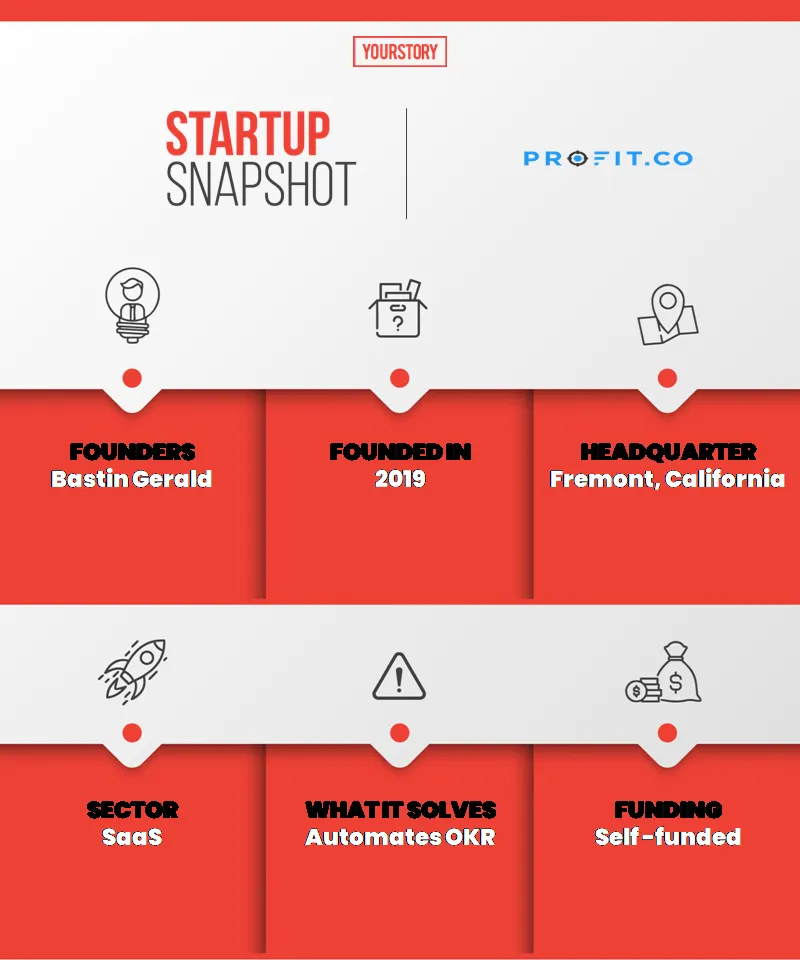How Bastin Gerald’s SaaS startup Profit.co demystified OKR in the modern era
Profit.co has taken the Objectives and Key Results methodology to 1,100 startup and enterprise customers in two years of operations.
In 2018, Bastin Gerald constantly heard friends, who worked in large technology companies, struggling to simplify OKR practices. Short for ‘Objectives and Key Results’, the abbreviation popularised by Intel’s Andy Grove in the 1970s made a dazzling comeback in the mainstream in 2017 because of venture capitalist John Doerr’s book, Measure What Matters.
“The practice that molded me at Intel and saved me at Sun Microsystems—that still inspires me today—is called OKRs,” Doerr wrote. “It's a collaborative goal-setting protocol for companies, teams, and individuals.”
Bastin himself had been a practitioner of OKRs for two decades, and immediately began work on a SaaS platform that helps enterprises adopt the OKR methodology and measure outcomes. That’s how Profit.co was born.
The SaaS startup has since built a base of more than 1,100 customers, up from 900 in 2019. It clocks 10 users per customer, on average. “We enable our customers to iterate faster by helping them set stretch targets that are aligned at all levels before guiding and shaping the behaviour of their employees to achieve desired outcomes," says Bastin Gerald, Founder of .

Profit.co
The company headquartered in Fremont, California, has 20 employees in the US and 65 employees in Bengaluru. Profit.co’s customer LTV (or, lifetime value) is three years. It takes between six and nine months to acquire new customers.
"Traditionally, OKRs have been used in the technology industry, mostly Silicon Valley,” says Bastin.
“In India, the IT services industry has become an enthusiastic adopter. It is seeing leaders actively embrace ‘digital’ and move up the value chain,” he explains.
But startups still lead the pack to hustle using OKRs because of the framework’s success in Big Tech corporations like Google, Apple, Facebook, Twitter and Amazon.
Profit.co makes the adoption intuitive using software.
Early years
Bastin, 49, grew up in Chennai, now the SaaS capital of India. He graduated from the Thiagarajar College of Engineering, and then finished a postgraduate diploma in business analytics from Loyola College Chennai in 1996.
He started his career as a process consultant, re-engineering business processes for big improvements in performance. His first job was with the TVS Group in Chennai, where he led the re-engineering of the warranty settlement business process, reducing the lead time from 210 days to 7 days. The project propelled the company to receive the prestigious Deming Prize.
He moved to the US to join Oracle in 1998 and worked on multiple roles implementing ERP software at Fortune 1000 customers and developing product strategy, GTM plans and strategic alliances with partners like Deloitte and Bearing Point. Bastin then studied at the Wharton School of Management at the University of Pennsylvania in 2006, before working at a fintech startup called CashEdge, now part of Fiserv.
After leaving CashEdge in 2011, Bastin started his first cloud app venture called Apptivo, a mid-market CRM solution that grew to more than 200,000+ customers globally.
Over the years, Bastin had seen both large companies and startups struggle with spreadsheets. And as OKRs returned to the technology zeitgeist, he built the Profit.co Minimum Viable Product (MVP) and launched it in New York in 2018.
It counts customers likeMystifly, a Bengaluru-based company that is levelling the playing field for travel agents by providing them with the tools and access to supply of travel inventory, traditionally available to large online players.
“Mystifly is using OKRs to improve their performance across the board, increase responsiveness and discover problems early, and do the required course correction using our OKR platform,” Bastin says.
Technology providers like SunTec Business Solutions are also creating high-performance teams through Profit.co’s OKR as a service. It provides the software, recommended process to implement, training and coaching programs and materials and related services. The Profit.io process to implement OKRs is called PEEL (Plan, Execute, Engage, and Learn).

Bastin Gerald, Founder, Profit.co
Focus on execution
Profit.co provides options for companies to create goals at various stages: company level, department level, team level and individual level. Teams can set their goals and align them to the corporate goals, or the level above. “This improves ownership and makes the goals of various teams and individuals clear for everyone, and also how the goals connect to the big picture," says Bastin. The product costs only $7 per user per month for smaller startups and has an enterprise sales model.
Once OKRs have been set and determined, employees and team leaders check in on the progress. As part of the company's weekly check-ins, managers have their own commentaries that help ensure that the OKR statuses are accurately represented. There is a dashboard feature in the program to help one keep track of what is going on throughout the entire corporation.
Using this tool, a user can see how each department is performing and how their performance contributes to the overall performance of the organisation. This information can provide the manager with insights on how the OKRs contribute to the bigger picture of managing a team. To break down a company's OKRs, Profit.co allows the manager to create individual tasks that help employees make progress and execute their key results. The manager has the ability to assign tasks too.
The third part of the cycle, , focuses on engaging employees. Profit.co allows the employee to interact with managers, peers and subordinates through an awards system that is based on completion of OKRs.
The final phase centres on learning. In this section, the manager and employees are able to reflect on their experiences. This gives the employee the opportunity to consider what he or she has learned already and where they want to go next.
"Even if you haven’t made progress with your OKRs by the end of your target date, you’ve probably learned a lot over that period of time—like what doesn’t work in helping you achieve your results,” says Bastin.
“Profit.co provides easy ways to document, search and retrieve lessons learnt across teams."
Its first customer was a software company providing solutions for the manufacturing industry in the US. In the past two years, Profit.co has expanded to industries beyond technology, such as insurance, biotech, pharmaceuticals, banking telecom, healthcare and sports.
Built to scale
The Profit.co platform is available in 13 languages, and the startup has been funded by Bastin himself who has put in more than $2 million dollars. Profit.co’s challenges in the early years were in finding the product-market fit for the first 50 paying customers and assembling a great team to scale.
While the company does not disclose revenues, Profit.co has grown to 1,100 customers in two years of operations. It competes with Jira, Range, GTM Hub, Proworkflow, Goals and Scientrix."We sell our offering on a subscription-based model, where we keep it simple and remove barriers to adoption with services such as OKR coaching for customers who need additional help,” says Bastin.
"We dissect the market in multiple ways—by size (enterprise to startups), industry verticals (tech and others), geographies etc. Each is unique in its own way, and has defining characteristics and challenges.”
Profit.co aims to scale up in the next 18 months. It plans to scale up its customer success efforts and ensure that its customers get greater value from offerings, expand its sales and marketing reach to even more enterprises. Its engineering team will enhance the platform offerings with continuous releases to help customers manage everything from strategy, OKRs, task management, and people processes. The proof of the product is in its employee engagement and development.
Profit.co has a 100/100 score for its customer support on Capterra, an online marketplace of software vendors owned by Gartner. The company has a long tail of customers with enterprises, mid-sized companies and start-ups, with customers in the Americas, Europe, India, West Asia, Africa, and Asia-Pacific.
"With powerful integrations, our OKR offering can be implemented easily in enterprises of any size, and results can be seen in a matter of days and weeks,” Bastin says. “Our employee development offering can help customers link performance management with goal management."
(Edited by Kunal Talgeri)









